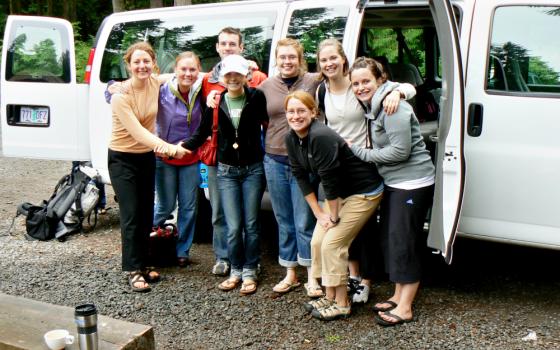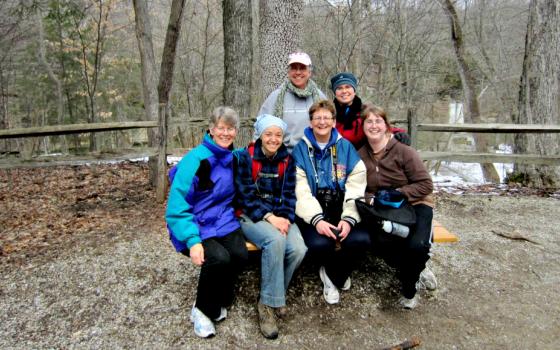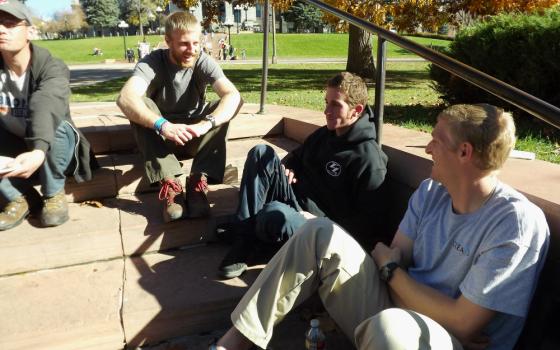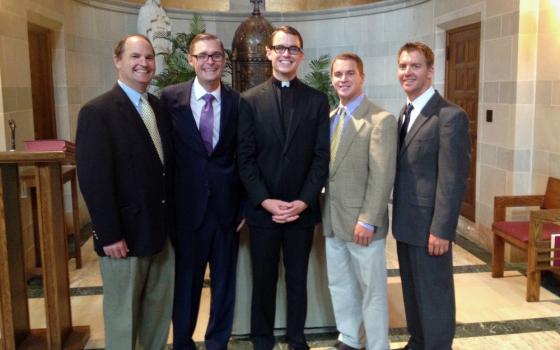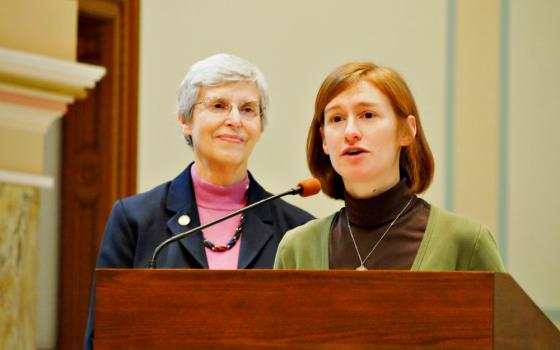When Tracey Horan started her internship with the Sisters of Providence of St. Mary-of-the-Woods, she had no idea what the next year would have in store. Horan thought that she might even "meet a nice farm boy and settle down."
Now, Horan is discerning her first vows with the same group of sisters.
Horan, who interned with the sisters at the White Violet Center for Eco-Justice as well as with AmeriCorps VISTA, sees her time as a volunteer as critical to her journey to religious life.
She recalls a moment on Valentine's Day where she was asked to help teach the sisters a dance to raise awareness about violence against women and also realized that she might be called to religious life.
"I just remember being in the front and showing them the moves to this dance and thinking there is nowhere that I'd rather be right now. And that was definitely one of the most memorable Valentine's Days I've ever had — I think that was kind of telling," joked Horan, who is also a contributor to Global Sisters Report.
Simple moments like these are what many former volunteers who have transitioned to a religious vocation say were crucial to their decision to pursue religious life.
While long-term volunteering is not a direct feeder to religious life, Catholic Volunteer Network did notice a connection between volunteering and vocations. In 2012, the organization commissioned a study to explore a variety of topics with former volunteers, one of them being consecrated religious life.
According to the study, "Volunteer Introspective," released in 2013, only 6 percent of those surveyed were currently pursuing a religious vocation, regardless of religion. However, many more volunteers have seriously considered a religious vocation.
Thirty-seven percent of volunteers surveyed have "considered a vocation to ordained ministry or religious life." Of those who have considered a religious vocation, 62 percent have "seriously considered" their call to a religious vocation.
Former volunteers are also much more likely to consider religious life compared to their Catholic counterparts who have never volunteered long-term. According to a 2007 CARA study, "Sacraments Today: Belief and Practice among U.S. Catholics," only 17 percent of Catholic men and 15 percent of women have ever considered religious life, compared to 54 percent of men and 31 percent of women in the "Volunteer Introspective" study.
In part because of these results, Catholic Volunteer Network, in collaboration with the Conrad N. Hilton Foundation, sponsors the From Service to Sisterhood Initiative, a program started in 2013 that "seeks to strengthen the vitality of the congregations of women religious through the development of volunteer programs," according to the network's website. (The Hilton Foundation also funds Global Sisters Report.)
The program helps provide financial support for congregations of women religious looking to start their own volunteer groups, as well as free discernment retreats and resources, like the online "Explore Your Vocation Resource Center."
Due to the lengthy nature of following a religious vocation, it is hard to quantify such efforts. Yet, anecdotally, everyone interviewed said their volunteer experience greatly influenced their decision to pursue religious life.
"Even though I had worked for a religious community [prior to volunteering], it was ... seeing [the sisters] like real people and how they integrate life and prayer and works and passion. And really just seeing that as an option, one way that I could do this work that I am really passionate about doing," said Eilis McCulloh, a second-year novice with the Sisters of the Humility of Mary and a former Franciscan Community Volunteer.
Similarly, Codi Krueger, a seminarian at St. John Vianney Theological Seminary in Denver and a former Christ in the City volunteer, felt that living in community helped prepare him for the seminary.
Living in community "just showed me the beauty of living in a strong Catholic community but also that it can actually be done. We can actually live that way, it's not something that's absurd or crazy, but it's something we're actually called to," Krueger said.
Jesuit Br. Matt Wooters agreed.
His discernment "became very real because, for all intents and purposes, I was living kind of like a Jesuit. I was working with the poor, living in community and had this sense of a strong spiritual component to my life. It was less imaginary at that point and it felt very real," said Wooters, who was in the Jesuit Volunteer Corps from 2009 to 2011 in Belize.
"It was exciting because I was so passionate about what I was doing in Belize and if that was a small glimpse of what maybe Jesuit life would be like, then I liked that," he added.
In addition to their encounters with those already in religious life, many former volunteers cite members of their previous community as important to their discernment.
When McCulloh was volunteering, a fellow volunteer was considering a call to religious life. "That was also a huge help, to have someone my age in the same position as me," McCulloh said of having another outlet to talk about her feelings with.
Out of the 14 missionaries during Krueger's volunteer year, at least four are seriously considering a religious vocation. For Wooters, he comes from a line of volunteers pursuing a religious vocation — out of those who have held the same position in Belize, he is the third Jesuit volunteer to become a Jesuit. "They call it the Jesuit maker, that's the joke of the job," said Wooters.
While none of Sister of Charity of Cincinnati Annie Klapheke's peers are pursuing a religious vocation, she found plenty of support from her Jesuit Volunteer Corps Northwest* community members. She took her first vows in early December 2016* and there to witness were a few of those members.
For those who are considering religious life while in a volunteer program, the former volunteers offered some advice: Find a spiritual director.
"St. Ignatius of Loyola was so insistent that everyone have a spiritual director and I think spiritual direction is so vital to your service year," said Bill McCormick, a Jesuit scholastic who volunteered with Jesuit Volunteer Corps Northwest. "There's so much going on; there's so much to process."
Krueger also recommends taking advantage of any retreats offered. "Those moments of silence and retreat have always helped me."
Asking questions and utilizing the resources from the program was key for Horan during her internship.
"Really investing in relationships with the sisters and really diving into some of the programs and experiences that were offered, it was so enriching. I think, at the time, I sometimes had fear about asking questions because I didn't want anybody to think that I was, you know, sure about moving forward and I sometimes wanted to be private about it," Horan said.
Ultimately, whether volunteers pursue a religious vocation isn't the point of the volunteer programs. Most of the former volunteers interviewed hadn't been discerning religious life prior to starting. However, a focus on community, simple living, social justice and spirituality — the four pillars of faith-based service — led the way.
Those four pillars "are the things that motivated me to join the Jesuit Volunteer Corps and I would say all of those desires were deepened and strengthened. So when I came out of my volunteer program, I was desiring those things even more and really realizing I wanted those to be core values that I lived in my life," Klapheke said.
"The motto for JVC is 'ruined for life,' " she added. "You can't go back to who you were. And so I laugh every time I think about that. Yeah, it ruined me for sure — it landed me in the convent."
*An earlier version of this article gave the incorrect branch of Jesuit Volunteer Corps and year
[Kristen Whitney Daniels is an NCR Bertelsen intern.]
